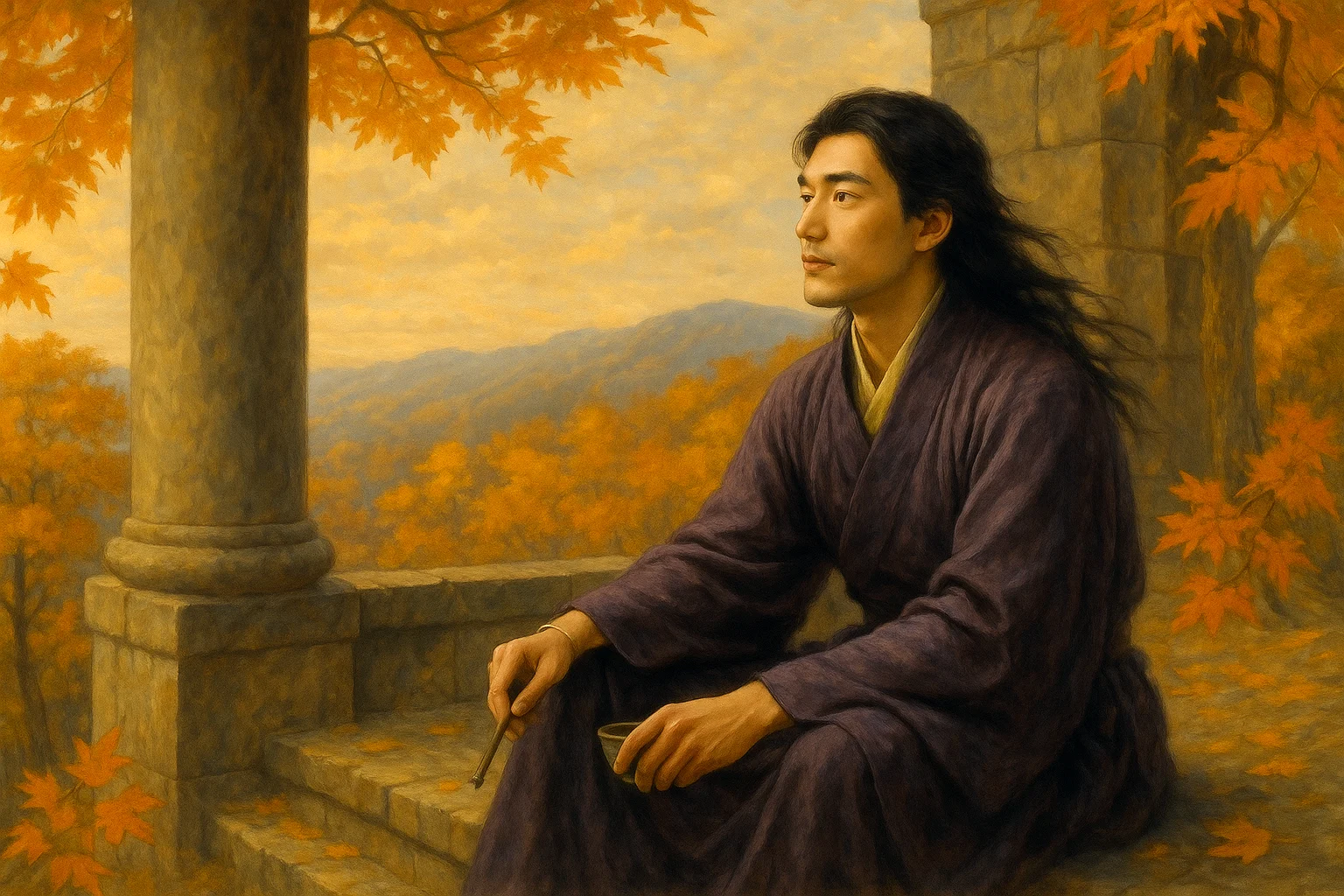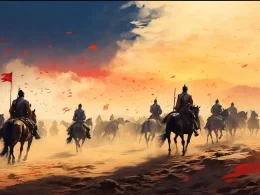First glimpse of sea from Wozhou's height,
Hand in hand with fashion's brightest light.
Summer's dawn unfolds roc-wings wide,
New moon tides where egrets glide.
The moon seems farther than sweet grass grows,
My stance towers where the sunset glows.
Like Yang Hu grieving scenes long past -
Who says our sorrows differ at last?
Original Poem
「登沃州山」
耿玮
沃州初望海,携手尽时髦。
小暑开鹏翼,新蓂长鹭涛。
月如芳草远,身比夕阳高。
羊祜伤风景,谁云异我曹。
Interpretation
Composed during Geng Wei's residence in Shu (modern Sichuan), this poem's exact date remains uncertain, possibly written during his service in the Jiannan Jiedushi's secretariat or while traveling through the region. Wozhou, near present-day Leshan, had been a strategic commandery since Tang times, its lofty terrain offering majestic views of rivers and distant seas. This work captures a mountain-top vista shared with companions, where the grandeur of the landscape inspires meditations on human existence and a profound resonance with ancient virtues.
First Couplet: "沃州初望海,携手尽时髦。"
Wò zhōu chū wàng hǎi, xié shǒu jìn shí máo.
First glimpse of sea-like vistas from Wozhou's heights;
Hand-in-hand with peers, we rival legends of our age.
The opening juxtaposes geographical and human magnificence. "Sea-like vistas" transforms the river panorama into cosmic vastness, while "hand-in-hand" suggests intellectual camaraderie. The bold claim to rival contemporaries (时髦) reveals the poet's aspirational spirit, framing the ascent as both physical and metaphorical elevation.
Second Couplet: "小暑开鹏翼,新蓂长鹭涛。"
Xiǎo shǔ kāi péng yì, xīn mìng zhǎng lù tāo.
Summer's minor heat unfolds roc-wings of promise;
Young moon-grass sways like egrets dancing on tidal surges.
Seasonal energy becomes mythological here. The solar term "minor heat" (小暑) ignites the legendary roc's flight, symbolizing boundless ambition. "Moon-grass" (蓂), a celestial plant in Chinese lore, merges with the avian imagery to create kinetic harmony—nature's rhythms mirroring human potential at its zenith.
Third Couplet: "月如芳草远,身比夕阳高。"
Yuè rú fāng cǎo yuǎn, shēn bǐ xī yáng gāo.
The moon hangs distant as fragrance on meadow winds;
My vantage surpasses the sinking sun's last glow.
Geng Wei's visionary imagery reaches its peak. The synesthetic "moon as fragrant grass" redefines celestial perception, while the bodily metaphor transcends physicality—the poet's consciousness literally overshadowing the diurnal cycle. This couplet embodies the Tang aesthetic of "marvelous conception" (奇思), blending perceptual innovation with existential grandeur.
Fourth Couplet: "羊祜伤风景,谁云异我曹。"
Yáng Hù shāng fēng jǐng, shéi yún yì wǒ cáo.
When Yang Hu mourned landscapes in their passing,
Who dares claim we differ from that noble heart?
The closing invokes Jin dynasty general Yang Hu's famous melancholy over rivers and mountains—a symbol of statesman's historical consciousness. The rhetorical challenge ("who dares claim") asserts continuity between past and present literati ideals. This historical mirroring elevates the personal outing into the Confucian tradition of "concern for all under heaven" (忧天下).
Holistic Appreciation
Ascending Wozhou Mountain is a masterful work of lyrical meditation through elevated perspective, where the poet blends the vista of Sichuan's Wozhou Mountain with companionship, seasonal transitions, and historical echoes into a richly layered poetic canvas. The first two couplets depict the mountain's majestic grandeur, while the latter two transition into personal reflection and historical resonance, building a profound and expansive vision.
The poem employs elevated diction and unconventional imagery, from "the summer heat unfolding like roc's wings" to the symbolic "fragrant grass", "setting sun", and the allusion to Yang Hu—all showcasing Geng Wei's exceptional artistry in distilling nature and history into cultural contemplation.
Artistic Merits
- Expansive Vista through Elevated Perspective: The opening couplet establishes a monumental spatiality—"first gazing toward distant seas" broadens the horizon, while "hand-in-hand with peers in their prime" amplifies its vitality, forging a heroic tonal foundation.
- Symbolism Interwoven with Realism: Natural motifs like "roc's wings", "lunar herbs", and "egret-tossed waves" carry layered metaphors, enriching the poem's imaginative depth.
- Allusive Subtlety with Lyrical Weight: The closing reference to Yang Hu (a Jin Dynasty statesman) adds historical gravitas, allowing the poet to project his ideals onto the landscape, merging self-reflection with timeless aspiration.
- Elegant Diction and Structural Precision: The poem's meticulous parallelism, rhythmic cadence, and musical phrasing exemplify classical regulated verse at its most disciplined yet expressive.
Insights
Beyond chronicling a mountain ascent, this poem embodies a spiritual ascent—a transcendence of self through historical and natural communion. The poet's elevated gaze bridges millennia, expressing both detachment from worldly concerns and a pursuit of moral idealism. It reminds us: at life's summits, we must honor history's lessons; amid nature's splendor, we must seek meaning beyond the visible.
About the poet

Geng Wei (耿湋, dates unknown), a Tang dynasty poet from Yongji, Shanxi, was among the "Ten Great Talents of the Dali Era." Renowned for his mastery of five-character regulated verse, his poetry is distinguished by its economical diction and tranquil imagery. While the prevailing style of Dali poetry tended toward austerity and desolation, Geng Wei developed a distinctive voice marked by understated naturalism.











